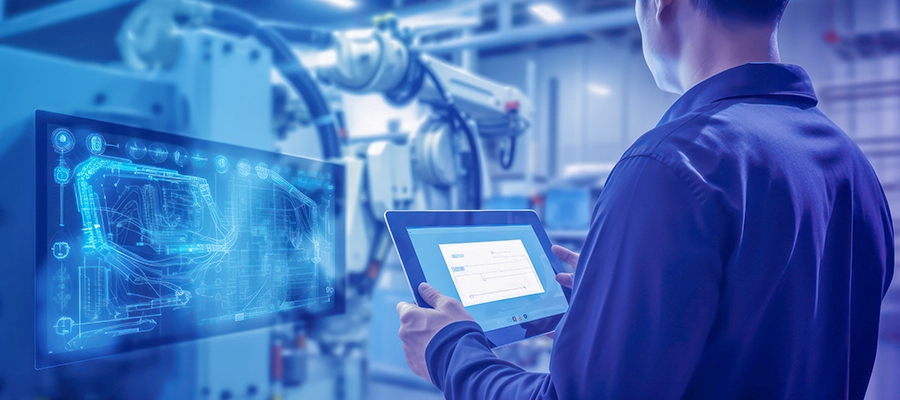
GxP Lifeline
Exploring AI and Machine Learning Beyond Large Language Models in Manufacturing

Let’s dive into a topic that's been scratching at my mind — artificial intelligence (AI) and machine learning in manufacturing. If you think AI is just chatbots and language models, think again. There's a whole lot more to explore when it comes to AI, and it's going to change the manufacturing industry forever. So, let's break it down.
The Many Roles of AI and Machine Learning
AI and machine learning are doing so much more than chatbots or fine-tuning your Netflix recommendations. They are changing the way work gets done and accelerating digital transformation in manufacturing.
Let’s look at the other types of models that exist and what their possible impact could be:
Classification
Imagine having a super-sophisticated sorting machine (that is probably not too hard for many reading this article). Now apply that to data, and that's essentially what a classification model does. For manufacturers, these models can categorize defects, identify material types, and/or sort components, potentially helping to reduce waste and increase overall product quality.
Clustering
Clustering models group data based on their similarities. These models are critical for understanding customer behavior, segmenting markets, and optimizing supply chains. For manufacturers, clustering models can group machines by usage patterns or maintenance needs, helping managers optimize operations and minimize downtime.
Regression
Regression models are like crystal balls making predictions. These models are used to forecast demand, set prices, and manage inventory. For manufacturers, regression models can predict when a machine might go down, allowing for proactive maintenance and reducing unplanned downtime.
Deep Learning
Deep learning is machine learning that deals with neural networks, like the human brain, with many layers. It's particularly good at handling large amounts of unstructured data, most commonly images and sounds. For manufacturers, deep learning modes are used often for quality control, spotting product anomalies, and possibly spotting intruders.
Using AI to “Moneyball” Your Manufacturing Business
If you have ever seen the movie "Moneyball," then you already know how data can change an entire industry. The film, starring Brad Pitt and Jonah Hill, retells the story of the Oakland A's and their use of data analytics to build a competitive baseball team with a tight budget. AI and machine learning is changing the manufacturing industry the same way data analytics changed baseball.
In the film "Moneyball," the Oakland A's are portrayed using data to analyze player stats to make decisions on players that traditional scouts overlooked. Similarly, AI in manufacturing analyzes production data to make decisions for predicting equipment failure, optimizing production schedules, ensuring quality control, and more. AI models analyze manufacturing data to spot patterns and insights that humans may overlook.
"Moneyball" showed how the A's competed with wealthier franchises by utilizing data to optimize their resources. AI and machine learning can achieve similar results for manufacturers by maximizing their resources to achieve higher production efficiencies. As an example, predictive maintenance helps manufacturers avoid costly downtime by servicing equipment before it ever breaks. This focus on efficiency allows manufacturers to do more with less, much like the A's did with their limited budget.
The Oakland A’s used data to challenge traditional scouting norms and player evaluation methods in baseball, and AI in manufacturing also challenges traditional ways of managing production. Traditional manufacturing relies heavily on employee intuition and experience. Although still valuable, employees together with AI's ability to process and analyze data can lead to increased improvements in productivity and quality. As the manufacturing industry continues to struggle with finding skilled labor, and as employees with years of experience and built-up intuition start to retire, AI can assist in employee training management to bridge the gap of lost experience.
Adopting AI in your manufacturing business is more than simply a digital transformation. In many cases, it will determine if a business keeps its doors open or closes for them for good. Manufacturing businesses leaning into AI are accelerating their operations at an extreme rate. Much like the Oakland A’s in the film “Moneyball,” those businesses using AI will surpass those that are not.
Clustering, Classification, Regression, Deep Learning, Oh My! What They Mean to Manufacturing
AI and machine learning aren’t merely industry trends — they’re becoming pillars of tomorrow’s manufacturing infrastructure. The following are some of these emerging technologies’ practical applications in manufacturing.
Demand Forecasting:
AI models can help manufacturers forecast demand to manage inventories, schedule production runs, and cut waste.
Smarter Decisions:
AI can turn too much data into actionable insights. It can spot production bottlenecks, suggest improvements, and predict maintenance needs, all of which drives smarter decisions across the manufacturing operations.
Real-Time Monitoring:
Use AI to track production, find issues, and send alerts to keep operations smooth and downtime low.
Predictive Maintenance:
Use AI to become more proactive and less reactive. Predict when machines or other assets will fail and stop downtime before it happens. AI can extend your equipment’s overall life and cut costs.
Quality Control:
AI can detect product defects better than human. Using deep learning, AI ensures only top-quality products reach the end customer, which boosts customer satisfaction.
Final Thoughts
AI and machine learning are transforming the manufacturing industry the same way data analytics first changed baseball. AI in manufacturing is improving demand forecasting, overall decision making, maintenance, and monitoring.
So, the next time you think about AI and its role in manufacturing, remember this: it's not just chatbots and language models. It's creating a smarter, more efficient, and more innovative industry. And that's something we can all get excited about.

